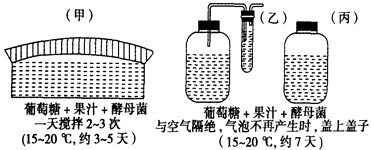问题
读图填空题
(附加题)下图简单表示了葡萄酒的酿制过程。请据图分析回答问题:

(1)葡萄酒的酿制原理是先通气进行有氧呼吸,以增加酵母菌的数量,然后进行_______获得葡萄酒。
(2)随着发酵程度的加深,液体密度会逐渐变低(可用密度计测量),其原因是_______。
(3)生产出的葡萄酒呈深红色,这种有色物质来源于________。
(4)在甲装置中进行搅拌的目的是_______;甲与乙装置中放出的气体主要是________。
(5)如果加入的葡萄糖过多,反而抑制了酵母菌的生长,得不到目的产物,原因是_____________。
答案
(1)无氧呼吸(无氧发酵)
(2)发酵时糖被消耗,产生酒精和CO2,酒精溶液的密度比糖水低
(3)葡萄皮
(4)增加溶氧量;让酵母菌与培养液充分混合 二氧化碳
(5)溶液浓度过大,会使酵母菌细胞过度失水,影响细胞的正常代谢
